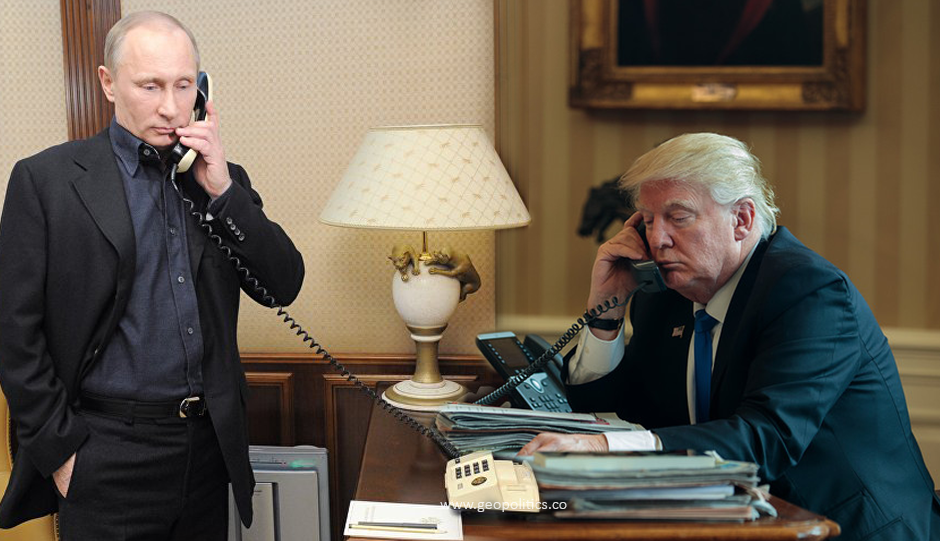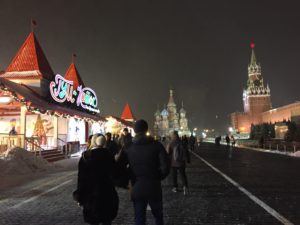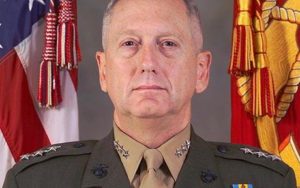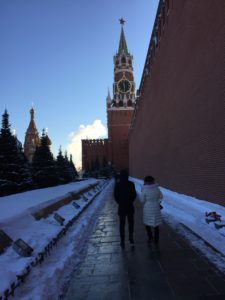Trump’s Quiet Outreach to Russia
Facing fierce resistance from Official Washington to a détente with Russia, President Trump has retreated publicly but continues to push ahead with more military-to-military cooperation, reports Gilbert Doctorow.
By Gilbert Doctorow
Many backers of Donald Trump’s planned foreign policy, which sought détente with Russia, are wringing their hands and shaking their heads over what looks like the policy’s defeat in the face of media and Democratic Party attacks, abetted by maverick Republican senators, in which “Russian contacts” and “Russian meddling” are the code words.
But there may be another way to see the situation. There are indications that Trump may be continuing to advance a more collaborative approach toward Russia through the quiet expansion of military-to-military cooperation, such as the recent meeting in Turkey to coordinate strikes against the Islamic State (ISIS) in Syria.
Still, the signs of a broader Trump retreat, even a rout, are undeniable. Several weeks ago we heard the first of several speeches from the new U.S. Ambassador to the United Nations Nikki Haley repeating the same tired anti-Russian rhetoric of her predecessor, Samantha Power. Then we heard Defense Secretary James Mattis in Bonn, Secretary of State Rex Tillerson in Brussels and Vice President Mike Pence in Munich speaking of unwavering support for U.S. allies and for NATO, the Cold War military alliance that Donald Trump had questioned during the campaign as “obsolete.”
And most recently there was the fact that Russia was not invited to the conference of the U.S.-led coalition of 68 countries against ISIS being held in Washington, D.C. on March 22-23. Russia’s exclusion would appear to contradict Trump’s campaign promise to forge an alliance with Russia to combat and vanquish ISIS.
Against this backdrop, one might expect the Russians to be in despair. After all, assuming they really had “meddled” in the U.S. presidential election, their risky efforts would have resulted in lots of pain and little gain. That was always one of the chief arguments against assuming that the Russians did undertake to undercut Hillary Clinton’s campaign, because the Russians would have assumed that their efforts would be detected by U.S. intelligence and surely would have infuriated the likely President Hillary Clinton. But even if Trump somehow had won against all odds, the Russians still would have faced the Russia-did-it controversy that now is consuming Washington and Brussels.
That’s assuming that the Russians did “meddle.” Assuming the opposite, that they were innocent of any “meddling,” then their hopes for a stroke of good luck with the arrival of a new President committed to détente would appear to have been dashed anyway. To paraphrase Viktor Chernomyrdin, a kind of Russian Yogi Berra in the local book of famous quotations, the Russians may have hoped for the best but it turned out as usual.
From the Sunday CNN interview of Dmitry Peskov, President Vladimir Putin’s press secretary, we got a sense of how the Kremlin views the anti-Trump feeding frenzy now going on in the U.S. media and especially the attempt to portray Russian “meddling” as the reason that Trump won. Peskov called these assertions the “demonizing of Russia,” a situation to which Russians cannot be indifferent.
But the sentiment was much less negative on some of the leading news programs in Moscow, including channel Rossiya 1’s weekly news wrap-up delivered by Dmitry Kiselyov, who heads the news services on all Russian state radio and television channels, and Vladimir Solovyev’s political talk show, which brought together some of the country’s top legislators and leaders of key policy think tanks.
General to General
Both the Kiselyov news program and the Solovyov talk show drew attention to a development that was covered in the U.S. and Western press but with little or no interpretation so that it was easily missed: the meeting in the southern Turkish resort of Antalya of senior military officers of Turkey, the United States and Russia to discuss coordination of their military actions in northern Syria, where they are operating in close proximity and often at cross purposes. The meeting involved the Turkish Chief of Staff Hulusi Akar, U.S. Chairman of the Joint Chiefs of Staff Joseph Dunford and Russian Chief of General Staff Valery Gerasimov.
From the Russian standpoint as revealed by Solovyov’s guests, the meeting went very well and the only glum participant leaving the meeting was the Turkish general. The Americans and Russians seem to have been in agreement over how to keep the U.S.-sponsored Kurdish fighters — so resented by the Turks — in the forefront of the assault on the ISIS “capital” at Raqqa, and, as a corollary, how to sideline Turkish ambitions of capturing a sphere of influence in northern Syria using Turkish troops and local Turkmen proxies.
Elsewhere in the Solovyov program, panelists hinted that there also are ongoing talks between Trump’s people and various Russian institutions. But the Antalya military contact — involving top generals for the first time since the deep slide in U.S.-Russian relations in 2014 over the Ukraine crisis — bears more attention.
Trump appears to have concluded that the way forward in relations between the U.S. and Russia is to make progress out of sight of the media. Whereas bringing Russia into the U.S.-run anti-Islamic State coalition meeting in Washington would have invited the U.S. media’s brickbats, a summit of generals in a provincial coastal town of Turkey could be far more productive and produce much less controversy. It is not for nothing that the press is now complaining that Secretary of State Rex Tillerson is inaccessible. That follows the desires of the Oval Office, which prefers a “just get it done” approach.
Trump can also expect the greatest loyalty in the U.S. government’s hierarchy from the military as well as fewer leaks from holdovers hostile to any rapprochement with Russia. Indeed, many senior U.S. officers had constructive relations with their Russian counterparts for years on crucial issues such as supplying U.S. troops in Afghanistan and in sharing intelligence on terrorism. That was disrupted by the coalition of neoconservatives and liberal interventionists dominating the State Department and holding top political jobs at the Pentagon. So Trump has removed many of President Obama’s political appointees and has turned more to the military high command.
If Trump as Commander in Chief can keep the military in line, that would be an enormous step forward compared to the closing months of the Obama administration when Defense Secretary Ashton Carter, who is regarded as a neocon ideologue, got away with stunning insubordination, including what appears to have been an intentional attack on Syrian military positions at Deir Ezzor.
That attack, killing dozens of Syrian soldiers, sabotaged the cease-fire agreement arranged in September 2016 by Secretary of State Kerry with the approval of President Obama. A military under tight control from the Oval Office is the best protection against similar provocations or just bad luck accidents in the field, incidents that could escalate quickly under conditions of a lack of trust and hair-trigger arsenals.
Despite the summit of the generals, panelists on the Solovyov show acknowledged that full cooperation with the United States in Syria or elsewhere is a long way off. Secretary of Defense Mattis’s report to Trump on how to conduct the war on ISIS does not provide for close cooperation with Russia, only for greater exchange of information. What the panelists clearly expect, though, is a more civilized relationship with the U.S. than under President Obama, even as the Americans still try to counter Russian influence in the region
A Confident Mood
The overall mood of the panelists was very confident, not because “their man” is in the White House, as U.S. media would have us believe, but as a result of what they construe as Russia’s winning hand in the Middle East, demonstrated by the visits to Moscow in the past week by two of the key players in the region’s geopolitics – President Erdogan of Turkey and Prime Minister Netanyahu of Israel.
To be sure, the visit by Erdogan had been planned long in advance around an agenda heavy with economic issues. It was to mark the culmination of the normalization process that began late last year when the Turks officially apologized for shooting down a Russian jet over Syria, which led to the killing of the pilot, followed by Russia applying very tough economic sanctions as retaliation for what President Putin called “a stab in the back.”
Now, however, with Erdogan’s visit on Friday, progress is being made on the two biggest projects around which Russian-Turkish economic relations are built: the Turk Stream gas pipelines and a major nuclear generating plant. Still, from the Russian perspective, as the panelists made clear, the Russians have the whip hand on the economic relationship with Turkey.
Turk Stream has importance for Moscow not so much for itself but because of the leverage it gives the Russians with Europe in forcing approval of Nord Stream II because Europe will not want to deal with Turkey as a major supplier of Russian gas. Moreover, the Russians are in no rush to lift the agricultural embargo they imposed on Turkey during the worst moments in their relations, nor are they re-instituting the non-visa travel, which existed before the shoot-down and which was very important for Turkey’s tourist industry.
But Erdogan’s real hopes for the visit lay elsewhere. Due to quick progress of Kurdish and Syrian state forces on the ground against ISIS, the Turkish president had pressing questions to discuss with Putin and wanted them resolved before the next meeting of the warring parties in Kazakhstan this week.
The Israeli visit was on very short notice, at the insistence of Netanyahu, and was also motivated by concern over how the end game in Syria is shaping up, with Iranian forces allied with Russia among the apparent victors. There was unanimity among the Russian panelists on this one point: The visits prove that Moscow is now the inescapable center to be courted by all those seeking solutions not only in Syria but in the broader Middle East. The Russians’ winning hand in Syria has come while it has cooperated with many competing sides in the conflict, including such adversaries as the Turks, Iranians and Kurds.
Russia is a co-guarantor of the partial ceasefire, which seeks to limit military actions to attacks on designated terrorist groups. Russia is also a leading actor in the talks between the Syrian government and the armed opposition being held in the Kazakhstan capital of Astana. Meanwhile, the panelists expressed deep satisfaction over the encouraging warming of relations with Egypt and over Russia having chosen the side in the Libyan civil war that looks to be coming out on top.
Genuine Experts
Unlike many American news shows where the “talking heads” are often journalists imparting second-hand information, the key panelists on these Russian programs tend to be well-connected legislators or other government insiders. For instance, last Sunday’s shows included Aleksey Pushkov, chairman of the Federation Council’s Information Committee and, until the last Duma election in September 2016, chairman of the Duma’s Foreign Relations Committee.
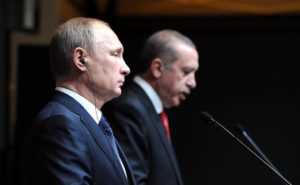 Russian President Vladimir Putin and Turkish
Russian President Vladimir Putin and Turkish
President Recep Tayyip Erdogan at a press
conference in Turkey on Dec. 1, 2014.
(Russian government photo)
The second major contributor on the Solovyov show was Vyacheslav Nikonov, chairman of the Duma Committee on Education but best known as the chairman of Russian World, the NGO which promotes the cultural interests of the Russian diaspora abroad. In that capacity, Nikonov, who is Kremlin aristocracy as the grandson of Molotov, also has a wide information base within and outside Russia. He is a Putin stalwart while also believing in Trump and in an eventual accommodation with the U.S.
The third legislator was the irrepressible Vladimir Zhirinovsky. Though known as something of a clown in the West for outrageous statements, he is in fact a very shrewd observer of the international scene and — as a Turkish-speaker and close follower of Middle East developments — his contributions were highly relevant to the discussion on how to get greatest advantage for Russia in the present Middle Eastern situation.
A fourth panelist was think tank director Yevgeny Satanovsky, director of the Near Eastern Institute. A fifth was Israeli Yakov Kedmi, who left the Soviet Union as one of the first Jewish activists who wanted out. Settled in Israel, he eventually became the director of one of their intelligence agencies. Persona non grata in Russia until several years ago, Kedmi has been invited back to Moscow recently to participate in Solovyov’s and other leading talk shows.
Serious Debate
Unlike RT, formerly Russia Today, which is the voice of Russia to global audiences, the shows on Rossiya 1 are directed at the domestic audience. On the Solovyov show, we have Russians debating with Russians about key issues facing the country, its capabilities and options.
Besides the broader geopolitical discussions, a top question of the day was how to turn Russian victories into something more tangible, meaning hard cash. The challenge was set out in the opening moments by the show’s provocateur, Vladimir Zhirinovsky, who insisted that Russia must practice a policy of deception: tell everyone what they want to hear, be friends to all, but serve only Russian national interests, starting with economic interests.
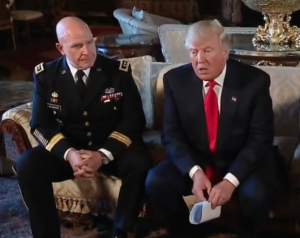 President Donald Trump announces the
President Donald Trump announces the
selection of Gen. H.R. McMaster as his new
National Security Adviser on Feb. 20, 2017.
(Screen shot from Whitehouse.gov)
Here is the point about American policy on which all the key panelists concurred: the tight relationship between geopolitical and commercial success by America is something Russia must emulate. Wars should always end in great financial benefits for the victors, we were told, and Russia should not hesitate to exploit its position as favored military partner in the Middle East at present to promote the interests not only of its oil and gas companies, but also its industrial companies for infrastructure projects in the region.
That being said, panelists questioned whether their country can overcome endemic corruption so that projects abroad genuinely benefit the Russian nation and not only selected state-owned companies. Moreover, the reserved Near East expert Yevgeny Satanovsky asked whether it is appropriate to engage in infrastructure projects abroad when there are great needs for the same in Mother Russia itself.
One point made by panelists which seemed to go unchallenged is that Russia should provide a defense umbrella with its S-300 and S-400 ground-to-air systems that locks in its strategic relationships from the Syrian conflict: for Turkey, Iran and Israel.
Whereas there are those in the Trump administration, possibly including the President himself, who reckon on wooing Russia away from Iran, it was clear from the well-networked panelists that Russian elites are dead set against any possibility of disowning their recent comrades in arms in Syria, notably Iran. Also, Iran occupies a key position in the Chinese led “One Belt One Road,” which Russia strongly supports. It is a key part of the North-South energy route that Russia also supports.
Vladimir Zhirinovsky has talked for many years about how and why Russia should stop looking West, should stop looking East, and should look to the South. But in the past, this recommendation had little content other than the offhand remark harking back to the Nineteenth Century when Russia and Britain were fierce rivals. Zhirinovsky said Russian soldiers deserved to take R&R on the shores of the Indian Ocean.
However, in light of Sunday’s discussion of commercial and diplomatic opportunities for Russia as a big player in the Greater Middle East, Zhirinovsky’s “look south” point of view is getting a new respectability in Moscow. The pressing question now is what the Trump Administration will make of all this once it can get past the rearguard skirmishes with domestic opposition and focus on how to interact with Russia.
Highlighting those continuing U.S. obstacles to a détente with Russia, the Kiselyov news wrap-up devoted one segment to the current American hysteria over Russia, labeling it “McCarthyism” as a number of Americans now do. The segment showed the Russian audience just who Sen. Joe McCarthy was and how he and other fierce anti-communists in the 1950s engaged in the sort of personal denunciations, destruction of careers and imprisonment of dissidents that older Russians vividly remember from the Stalin era.
The segment concluded with a reminder of why comic genius Charlie Chaplin, whom Russians know and love from childhood, spent the last 25 years of his life in Switzerland – after being hounded out of the United States in the zealotry of McCarthyism. This Russian TV segment was not “holier than thou” with respect to the United States, but rather self-confident as if saying: Russia has been through its own version of this intolerance and regrets that another wave is now sweeping the U.S.
Gilbert Doctorow is a Brussels-based political analyst. His latest book, Does Russia Have a Future? was published in August 2015.
___
http://consortiumnews.com/2017/03/14/trumps-quiet-outreach-to-russia/
